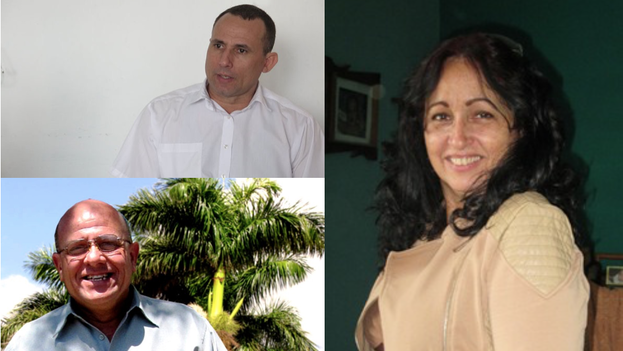
![]() 14ymedio, Reinaldo Escobar, 21 March 2016 — A group of government opponents and activists from independent Cuban civil society have scheduled a meeting with President Barack Obama on Tuesday morning. This newspaper has contacted three of them to ask them what they plan to say at that meeting.
14ymedio, Reinaldo Escobar, 21 March 2016 — A group of government opponents and activists from independent Cuban civil society have scheduled a meeting with President Barack Obama on Tuesday morning. This newspaper has contacted three of them to ask them what they plan to say at that meeting.
Jose Daniel Ferrer is one of the eleven former prisoners of the 2003 Black Spring who remains in Cuba and is also the leader of the Cuban Patriotic Union (UNPACU), one of the opposition organizations with the most members and one that maintains permanent action in support of human rights. Every time he crosses the capital city he has to do so almost clandestinely because State Security pursues him to deport him to the province of Santiago de Cuba where he has permanent residence.
“In UNPACU we greatly appreciate President Barack Obama’s gesture of inviting us to a formal meeting at the United States Embassy in Havana and we also appreciate the gesture of solidarity of having invited colleagues from diverse civil society organizations, the opposition and independent journalists who have as a common cause the fight for the respect for human rights and for a free, just, democratic and fraternal Cuba.”
Jose Daniel Ferrer brings a charge from his comrades in the struggle. “This time that we are with the distinguished visitor we will use first to congratulate him for his bold decision to start this process of normalization of relations that has led even to his visiting the island. We are going to also congratulate him for the incredibly novel initiative he took to talk with the Cuban humorist Pánfilo which has had a tremendous effect on the population.”
I will ask that this position of solidarity that he is taking with the Cuban people be maintained even beyond his term as president, because being a high-ranking figure in the world, and even a Nobel Peace Prize laureate, he can continue to positively influence relations between the two nations and move others to support the suffering Cuban people who lack rights and freedoms and are living in deep misery.
Dagoberto Valdes is an agronomist who likes to present himself as a “yagüero” for the years he was sentenced to perform the humble work of collecting the “yaguas” (fronds) that fell from the palms in his province of Pinar del Rio. He is the director of the Coexistence Project, and the magazine with the same name, and of a Study Center that professes to be an authentic group of thinkers on Cuban matters.
“In the first place, I believe that the meeting with President Obama puts things in their place. It opens a new stage in which the historic enemy, necessary for these totalitarian systems, is turned into a visiting friend and therefore attention begins to focus on the real problem which is nothing more than the normalizations of democratic relations between the Cuban people and their government,” he told 14ymedio by phone.
He says he does not intend to ask for anything at the meeting. “The time our meeting lasts, at least the part that involves me, I will use to tell the president of the United States about the possibilities, the abilities, the projects with which the Cuban people are capable of being the protagonists of their own history.”
Miriam Celaya worked for a long time as an anthropologist, but obviously was born to be a journalist. She moved into the profession by way of blogs and now her byline is solicited by diverse media who request her penetrating analysis of Cuban society.
She says that the fact of being invited to a meeting of this kind, at this level, is an exceptional opportunity: “In addition to being a historical event, it is an opportunity to share with very valuable people about paramount topics.”
Asked if she has already noted what she wants to say this Tuesday, she clarifies, “I know that others will focus on repression, and the general issue of human rights and many other problems, including mentioning the concern that many have about how this rapprochement has advanced on the American side without seeing advances on the Cuban side. But I would like to concentrate on something that seems fundamental in the work of re-weaving our civil society and that is the issue of freedom of expression.
“It is not about our going there to ask for funding, like the official propagandists believe, but helping us with the desire to raise awareness about the need to support independent Cuban journalism. To empower the people they have to empower themselves with information, to be well informed at this stage when the government has an almost absolute monopoly on the media. And for people to know in depth the real scope of the measures the United States government is taking now, it is essential that an independent press has the ability to reach the citizens.”
